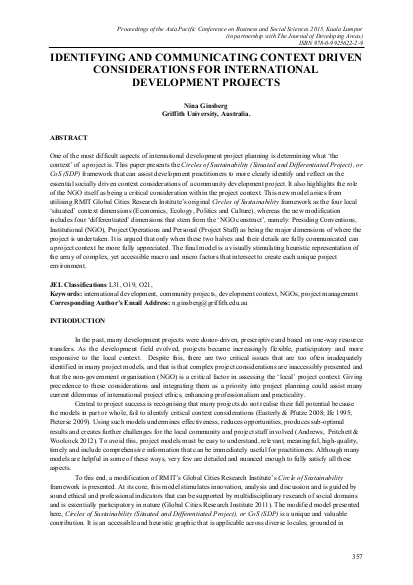
One of the most difficult aspects of international development project planning is determining what „the context? of a project is. This paper presents the Circles of Sustainability (Situated and Differentiated Project), or CoS (SDP) framework that can assist development practitioners to more clearly identify and reflect on the essential socially driven context considerations of a community development project. It also highlights the role of the NGO itself as being a critical consideration within the project context. This new model arises from utilising RMIT Global Cities Research Institute?s original Circles of Sustainability framework as the four local „situated? context dimensions (Economics, Ecology, Politics and Culture), whereas the new modification includes four „differentiated? dimensions that stem from the „NGO construct?, namely: Presiding Conventions, Institutional (NGO), Project Operations and Personal (Project Staff) as being the major dimensions of where the project is undertaken. It is argued that only when these two halves and their details are fully communicated can a project context be more fully appreciated. The final model is a visually stimulating heuristic representation of the array of complex, yet accessible macro and micro factors that intersect to create each unique project environment.
Links
Resource collections
- UN Habitat - Urban Response Collection
- Urban Response - Urban Crisis Preparedness and Risk Reduction
- Urban Response Collection - Community Engagement and Social Cohesion
- Urban Response Collection - Economic Recovery
- Urban Response Collection - Environment and Climate Change
- Urban Response Collection - Housing, Land and Property
- Urban Response Collection - Urban Crisis Response, Recovery and Reconstruction
- Urban Response Collection - Urban Resilience